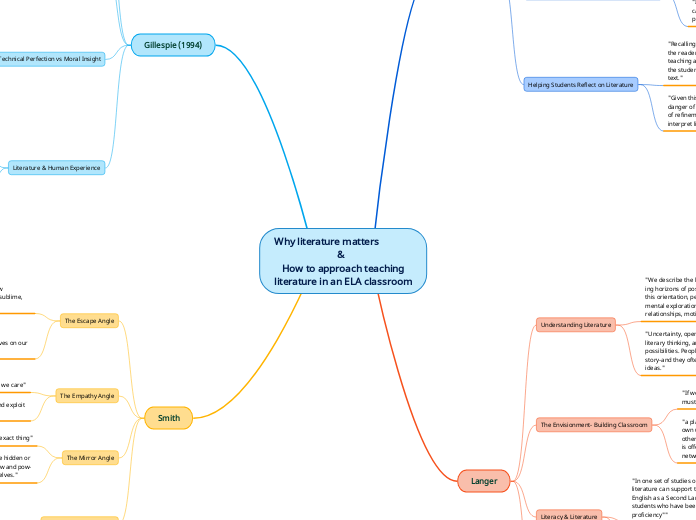Why literature matters
&
How to approach teaching
literature in an ELA classroom
Rosenblatt
Recognizing Factors in Literary Experience
"The quality of our literacy experience depend not only on the text... but also on the relevance of past experiences and present interests that the reader brings to it"
"Without sufficient relevant experience, he can evoke nothing from the page."
Avoiding Overemphasis on the Work
"We cannot afford merely to assume that the reader's contribution will be taken care of, or to imply that simple exposure to a sequence of works is sufficient"
"Our aim, after all, is to help students develop a lifetime habit of turning to good literature"
Avoiding Overemphasis on the Personal Factor
"If to be concerned mainly with books does not insure a sound curriculum, so also are there dangers in too narrow a concern with the personal factor"
"Insistence on the capacity to arouse emotion as the test of art can lead to the notion that that work is greatest which produces a response in the greatest number of readers"
Helping Students Reflect on Literature
"Recalling that the literary work is something lived-through by the reader, we can recognize that "teaching the library work"-- teaching a novel or teaching Rome and Juliet--- means helping the student primarily to reflect on what he has made of the text."
"Given this view of literary communication, we can avoid the danger of putting one or another peripheral concern in place of refinement of the student's power to enter into and to interpret literary experiences"
Langer
Understanding Literature
"We describe the literary mode as "explor-
ing horizons of possibilities," because from
this orientation, people do a great deal of
mental exploration. They explore emotions,
relationships, motives, reactions."
"Uncertainty, openness, and imagination are a normal part of literary thinking, and new understandings provoke still other possibilities. People search for the "real"story-the "hidden" story-and they often create scenarios as a way to explore ideas."
The Envisionment- Building Classroom
"If we are to change how students engage in literature, we must change the essential culture of the classroom."
"a place where students have room to form and develop their own understandings, where they use interactions with each other to explore ideas of their own, and where mutual support is offered by students as well as teachers as part of the social network"
Literacy & Literature
"In one set of studies our emphasis has been on the ways
literature can support the process of literacy development in English as a Second Language and bilingual classes for students who have been designated as having "limited English proficiency""
"In another set of studies we investigated the role literature can play in literacy development in classes of culturally and linguistically diverse students"
So What?
"Supporting students' development of literary understandings is often difficult for teachers to sustain for lack of instructional models (because the very reasoning processes they wish to support are often in conflict with some well-worked pedagogical routines). "
"From our interactions with the students, we became convinced that literature, including scenario-building and storytelling, can play an important role in enriching students'
understandings across subject areas, and the process of exploring horizons of possibilities can be helpful in content classes even when literature is not read and point of reference learning is the goal"
Gillespie (1994)
Imagination & Empathy
"Literature does offer--inexpensively--a vision of
other lives and other vista"
"One of its potential benefits is to enlarge a reader's sense
about the many possible ways to live"
Connections to the Classroom
"What seemed missing from too many of the stories was that
rare experience of getting inside the skin of another human being"
" I wished more of these young writers' imaginative and empathetic skills were as refined as their technical skills"
Technical Perfection vs Moral Insight
"More
time was spent on writing techniques than
on the human issues in students' stories. I
realized that my students need more than just hints on technique when they are experimenting with fiction"
"Yet
craft in writing must serve content; technique ought to be employed not for its own
sake but in the service of some truth the
writer is pursuing."
Literature & Human Experience
"The calling of literature is to explore hu-
man experience in all its dimensions and
possibilities."
"Literature deals with our most
pressing concerns-family, death, religion,
love, good and evil, destiny, will, justice,
character, courage-issues not often covered
in an Applied Communications or Business
Writing unit"
Smith
The Escape Angle
" A good work can take us from our relatively narrow experiences and place us in a more exotic, thrilling, sublime, complex, or entertaining place"
"It can put us in a
different culture, consciousness, time period, and
situation. It can give us distance from and perspectives on our daily dilemmas"
The Empathy Angle
"We often read to find
out what happens to people about whom we care"
"Great writers captivate us with our concerns and exploit
our identification with these fictitious folk"
The Mirror Angle
"None of us reads the same exact thing"
"What we create can open up heretofore hidden or
forgotten recesses. It can move us in new and pow-
erful ways. It can reintroduce us to ourselves."
The Time Machine Angle
"Reading actively allows us to converse with the greatest minds
in history"
"In short, we can take part in the Great Conversation of humanity"
